“Story of a dying empire”: Georgia’s “foreign agent” law protests echo Ukraine’s Euromaidan
Nearly a decade after Ukraine's Euromaidan revolution, the struggle against Russian influence has found new life on the streets of Tbilisi, where protesters see the "foreign agent" law as a haunting echo of the empire's last gasps.
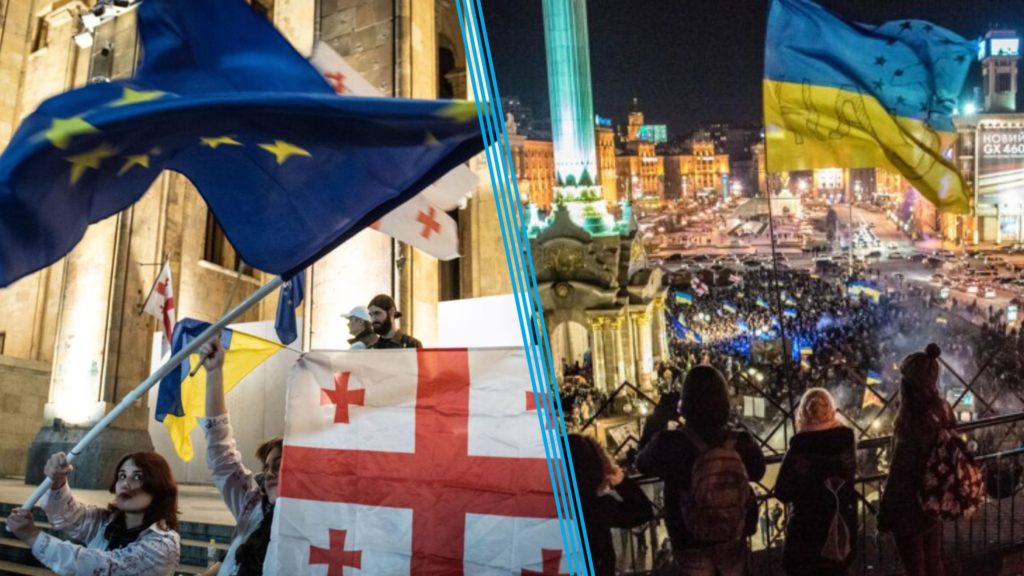

In a remarkable display of defiance, over 100,000 Georgians have taken to the streets to protest the controversial “foreign agents” law, adopted by the country’s parliament on 14 May. The massive turnout, particularly significant given Georgia’s population of just three million, underscores the growing sense of urgency among ordinary citizens who fear that their country’s future has been hijacked by pro-Russian forces.
According to Aka Zarkua, a correspondent for the American media outlet Eurasianet and executive editor at the Georgian’s Realpolitik outlet, the protests are a response to the perceived threat posed by Russian oligarch Bidzina Ivanishvili, whose influence over Georgian politics has raised concerns about the country’s ability to chart an independent course.
The democratic backsliding and rise in authoritarianism preceding Georgia’s protests, as well as the grassroots popular resistance to the country’s pro-Russian course, hauntingly resemble Ukraine’s Euromaidan revolution, to which Russia retaliated with occupation, conflict, and, two-years ago, a full-scale war.
With the specter of a Russian invasion looming large and Western powers seemingly unable to offer meaningful support, Georgia finds itself at a critical juncture in its long and complex struggle to break free from Moscow’s orbit amid what he says are the final convulsions of the dying Russian empire.
This is a summary of a conversation with Aka Zarkua with Euromaidan Press editor-in-chief Alya Shandra and Ursula Ruedenberg, manager of Pacifica Radio’s Affiliate Network Division, on the weekly program Ukraine 242. You can listen to the program here and here.
Protests erupt against the “foreign agents” law
The law was inspired by a 2012 Russian analog, adopted after Putin’s return to power as president following Dmitry Medvedev’s four-year term. It effectively killed all opposition and differing views in Russia by labeling independent media outlets and NGOs as foreign agents, forcing them to close.
Protests against the Georgian “foreign agent” law in Tbilisi, 11 May 2024. Photo: Oc-media
This Kremlin-style law was the trigger for the protests because it endangers Georgia’s integration into the European Union. But it also encapsulates all the woes of the Georgians with 13 years of the Georgian Dream’s rule. If Ivanishvili hadn’t been so successful in suppressing political alternatives, protests likely would have erupted earlier.
Particularly, the protests are driven by the Georgian government’s pro-Russian position since Russia’s full-scale invasion of Ukraine. Then, the Georgian government’s rhetoric shifted towards hostility to Ukraine and the West. The prime minister declared that Georgia would not align with the sanctions imposed on Russia. Although the government largely executes sanctions, as no large-scale circumvention schemes such as in Türkiye, Kazakhstan, or Armenia were discovered. But strangely, on a declarative level, they claim that imposing sanctions on Russia would collapse their economy.
Bidzina Ivanishvili, the founder of Georgian Dream, the ruling party that introduced the law, is a Russian oligarch with a fortune of five billion dollars—one-third of Georgia’s GDP. He has been the prime minister of Georgia for one year and announced his return to politics as the honorary chairman of the ruling party at the end of last year.
The Georgian Dream Party leadership has been talking about a “global war party conspiracy,” suggesting that powerful people want to drag Georgia into a war with Russia and open a second front. They claim that the Georgian government declined this invitation and is now being punished by the West.
This rhetoric preceded the first introduction of the foreign agents law in the spring of 2023 when it was met with heavy resistance from Georgian civil society, media, and the population, leading to a week-long standoff in the streets of Tbilisi. The government withdrew the initiative, fearing that police resources would be depleted. The Georgian Dream Party took back their initiative and promised not to put forward this law again. Its reintroduction now is likely the result of the lack of damage to Ivanishvili for his anti-Western rhetoric and action.
The scale of the current protests have taken the government and opposition by surprise, with the younger generation, particularly Gen Z, at the forefront. The protests are heavily decentralized and autonomous, with different atmospheres and groups of people throughout the rally. No political party has control over these forces.
As a heavily politicized kid from a politicized family, going to rallies from a young age, the current protests resemble the events of the Rose Revolution in 2003, which deposed the government of Eduard Shevardnadze. Every layer of society is participating, including sportsmen, artists, and university students.
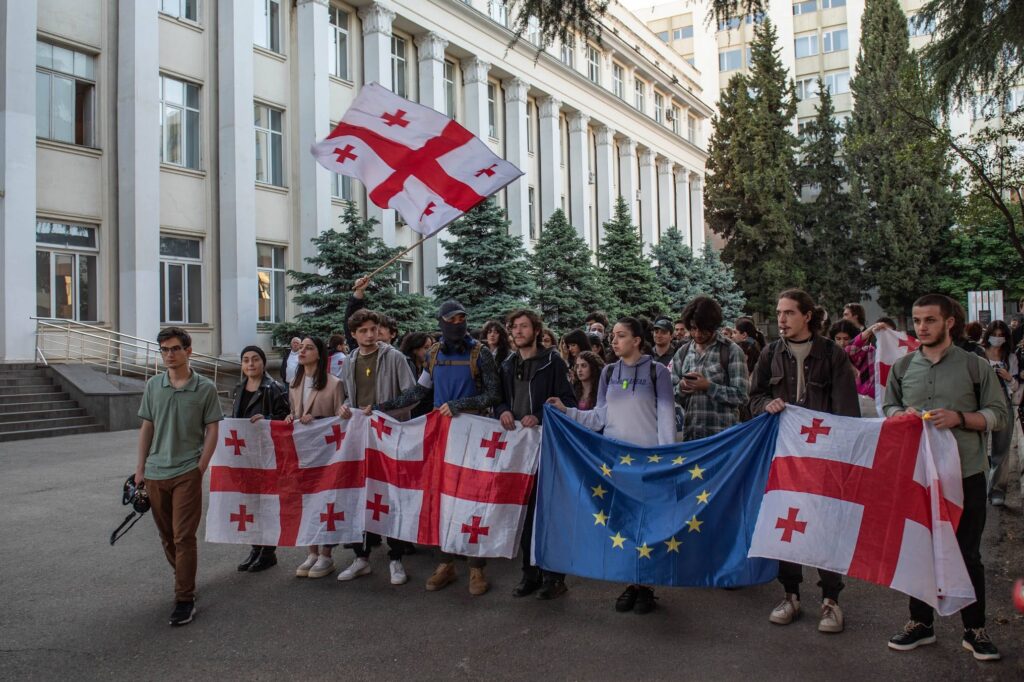
Political parties are participating in the process but are not the main drivers or organizers. They did organize some rallies and participated in parliamentary hearings, with heated debates and even physical clashes with MPs of the Georgian Dream party. But what we are seeing now in the streets does not come from party initiatives, it’s self-born.
Attack on Georgia’s sovereignty and the country’s path towards European integration
Georgia perceives this law as an attack on Georgia’s sovereignty and path towards European integration. These two issues are the strongest nerve of Georgia’s population right now and its unifying force over the past 20 years, especially after the failed state of the 1990s, which was involved in civil wars and influenced by criminal gangs.
After the Rose Revolution of 2003, when the country consolidated and centralized power, the main nerve center of Georgia’s independence and population was Euro-Atlantic integration—into Western Europe, the EU, and NATO. This is enshrined in the Constitution as the sole foreign policy path, which is why the law is perceived as unconstitutional.
We have a constitutional right to protest peacefully and mount resistance if our constitution is violated through unilateral foreign policy changes by the government.
Right now, the demonstrations appear large and peaceful but could escalate like Ukraine’s Euromaidan with fires, barricades, battlegrounds, and deaths. Three protests are planned in the next days, and for Georgia’s Independence Day (26 May).
President makes ceremonial veto, but law slated to go ahead
President Salome Zourabichvili, a French-born Georgian politician who labeled the Georgian Dream party the “Russian Dream,” vetoed the “foreign agents” bill, saying it should be completely revoked or nullified and is unacceptable in any form.
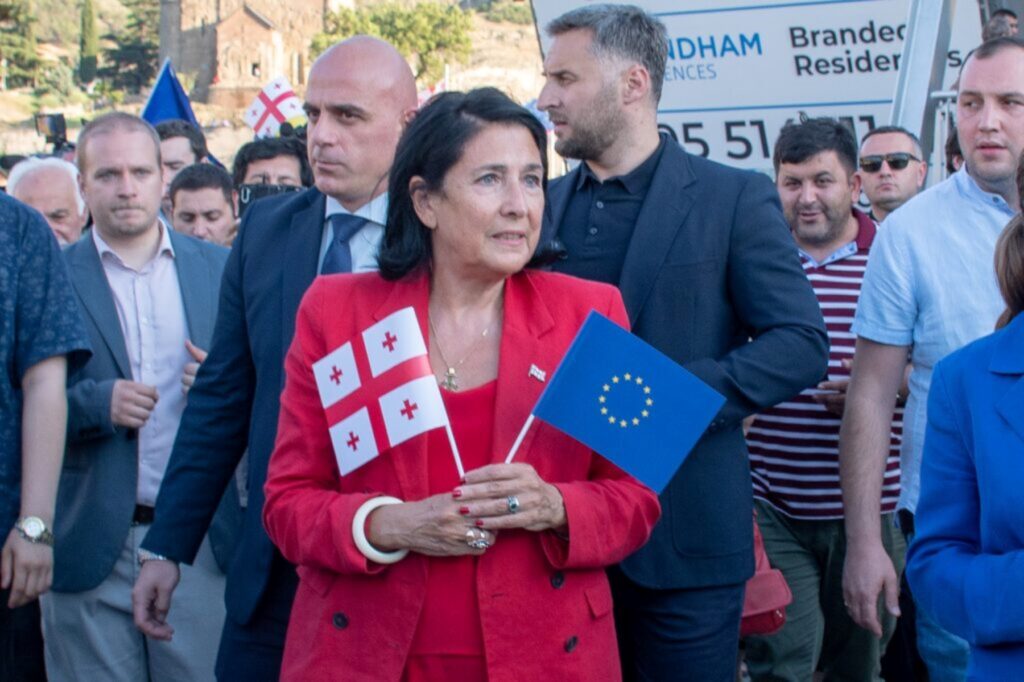
The Venice Commission, a legal committee that checks compatibility with EU law, came to the same conclusion in a report – that the law stigmatizes civil society, has huge risks, and resembles legislation in Russia and Kyrgyzstan. They said Georgia should revoke the law.
This sparked outrage from the ruling Georgian Dream party, who claim the Venice Commission is under control of the “global war party.” Parliament starts session again next week and Georgian Dream says they will override the veto and implement the law.
Dissatisfaction among the public remains high, but media have focused on the future configuration of opposition parties in the election. After initially record protests, rallies took on a more festive atmosphere, as police have not interfered since parliament passed the law. Demonstrations were left alone, becoming gatherings with no clear aim or projection of power.
Georgia’s current economic and political elites view these protests as a threat to their social standing and business assets. They’ll try to do everything to avoid that threat.
Internationally, there is increasing talk of sanctions. A US congressman from South Carolina introduced the MEGABARI Act to sanction Ivanishvili and Georgian Dream officials with travel bans and other restrictions if the law is implemented. But they also signal that if democratic decline is reversed, the US would be ready to talk about visa liberalization and trade agreements with Georgia. They’re showing both the carrot and the stick.
Sanctions pose a significant threat to Ivanishvili personally. But they could also further consolidate the ruling elite around him, similar to what we saw happen with Vladimir Putin in Russia. That risk exists as well.
Georgia’s protests are first of all a desire to have security from Russia
Georgia is located on the southern border of Russia and has two regions occupied by Russia, a consequence of Russia’s first attack in the five-day war of 2008. But Georgia was first lost to Russia in the early 19th century.
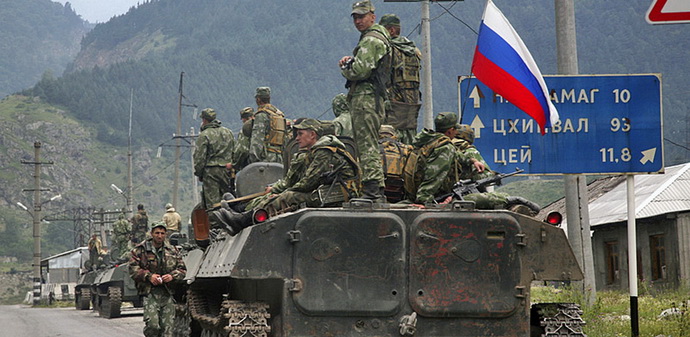
So for Georgians, European integration first and foremost means safety and security from Russia. For Georgians, a country of three million, security from Russia, with its population 145 million and nuclear weapons, is only possible if they are a member of a greater alliance with greater might.
So, the only way for Georgia to be free and at peace is to join the European Union and NATO. This has been the perception of Georgia’s population for the last thirty years.
Ukraine’s Euromaidan 2013-2014 protests, also termed the “Revolution of Dignity,” had this international security aspect as well. But it was also about the personal experience of European life: Ukrainians understood it as having a functional democracy, which means dignity for all people, as opposed to the post-Soviet state, where there is a lack of dignity.
This applies for Georgia as well. A huge number of Georgian citizens are working in European countries and supporting their families in Georgia. They see firsthand the benefits of life in the EU.
Similarly, many Georgians also have a personal experience of living in Russia – without liberties, without the ability to speak their mind openly. Illustrative of the attitude that Russia has towards Georgians is a 2006 incident, when Russia deported nearly 10,000 Georgian citizens living illegally in Russia by planes meant to transport livestock to punish the Georgian government.
So Georgians know there will be no dignity, no safety, no security if Russia wins and if they have to live under Russia’s influence.
There is little choice: Russia cccupied 20% of Georgia’s territory in 2008, installing puppet governments there, occupied Ukraine’s Crimea in 2014, and in 2022 started a full-scale, genocidal war against Ukraine with tens of thousands of people killed and huge war crimes.
How is a pro-Russian government possible if Georgia’s population is so anti-Russian?
My foreign friends visiting Georgia ask how Georgians can be so anti-Russian but nevertheless have a government that simply repeats the talking points of Russian propagandists.
My answer is that Georgia’s current rule can be compared to the new far-right regimes in countries like Hungary.
Over the last 12 years, Ivanishvili has built a strong vertical of power and effectively suppressed all alternatives. For instance, no opposition party can get funding from big business: they are all aligned with Ivanishvili.
Ivanishvili now controls a huge, monopolized state apparatus – all levels of courts, judges (some sanctioned by the US), every ministerial post, and tax collecting organizations. He’s the boss on top of this pyramid structure, which is part of the multifaceted scheme with which he maintains power.
As well, Ivanishvili has led a successful propaganda campaign that exploited the mistakes of Georgia’s opposition. That is how he claimed victory in the last couple of election cycles, although some elections were accused of violations.
In the last 10 years, he demonized the previous government under Mikheil Saakashvili.
Saakashvili, the third president of Georgia and leader of the pro-Western Rose Revolution, lost the election in 2012 to Bidzina Ivanishvili. Saakashvili’s tenure is mixed. Although he is credited with modernizing the country and steering it towards a more Western-oriented path, he is also accused of strengthening authoritarian tendencies. His last years were marked with massive violations of human rights in prisons, problems with prisoners’ rights, and police abusing force.
Georgia’s current government exploits these facts, claiming that if they are not in power, the National Movement Party of Saakashvili will come back, and people will be beaten, tortured, and thrown into prison.

They polarize society by falsely claiming that all the opposition, NGOs, and media are controlled by Saakashvili and therefore there is no alternative to the Georgian Dream.
As well, Ivanishvili scares Georgians with the specter of war, claiming that if he is not in government, war with Russia is inevitable. This has been the Georgian Dream Party’s main propaganda line over the last two years – that only they can manage the situation without war and any change in government will end in a war-like situation with Russia.
“Georgia is not Euromaidan,” say Georgian officials
Major protests are often preceded by a decline in democracy and power grabs.
This was the case in Ukraine’s 2013-2014 Euromaidan Revolution, as leading up to it, President Viktor Yanukovych and his Party of Regions also concentrated power in their hands. In Georgia, we see the same growing authoritarianism, decline in democracy and freedom, allowing those in power to make choices the population doesn’t support.
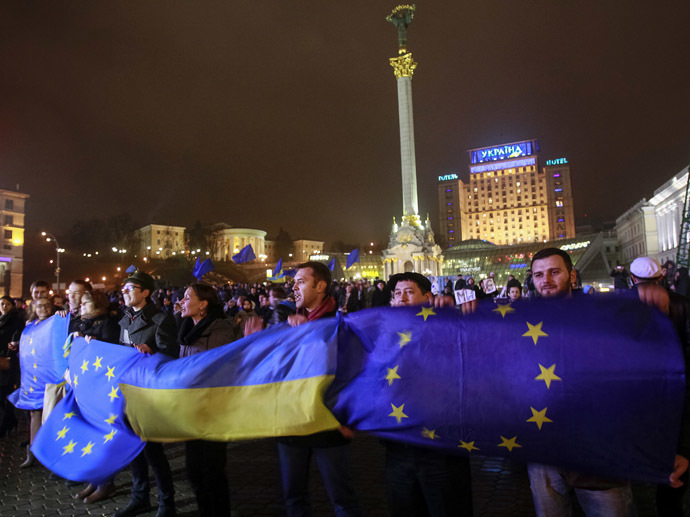
Russia used Euromaidan as a scarecrow to frighten populations in post-Soviet republics, implying that if you protest, Russia will punish you by invading. Georgian Dream officials are now using Euromaidan in the same way.
In a rare 20-minute program speech in April, Bidzina Ivanishvili himself claimed the Euromaidan Revolution of Dignity was a process organized and executed by foreign powers in Ukraine. He claimed that it was this supposed foreign intervention that led to destruction, killing, and impoverishment in Ukraine, not the Russian invasion.
Ivanishvili warned that Georgia is not Yanukovych’s Ukraine, meaning he won’t allow a change of government through popular protest. The Interior Ministry’s actions suggest they are willing to escalate and beat up protesters, drawing parallels to the West’s crackdown on demonstrators.
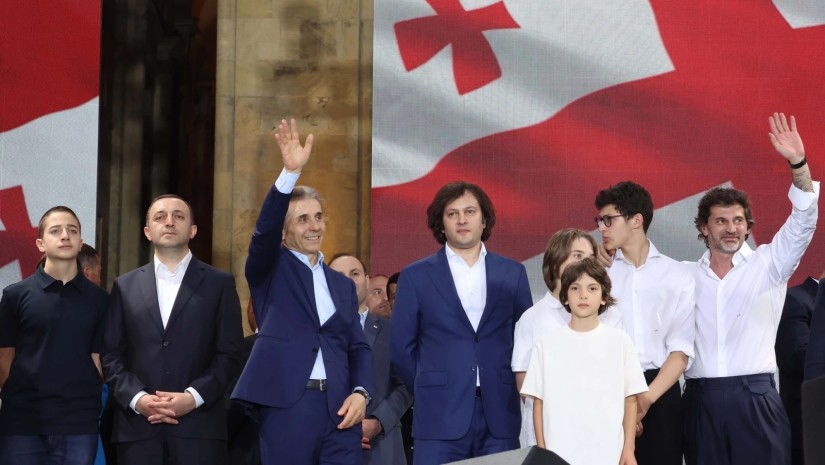
The Georgian government views Euromaidan as a hostile threat to their rule, just as the Kremlin perceived it. If protesters can mount physical resistance to the regime and police, it threatens them. We’ve already seen arrests with preliminary two-month sentences for police disobedience and damaging state property, as well as a campaign of physical assaults, shaming posters, and threatening phone calls against opposition figures to deter them from protesting.
“People believe they can change something”: the self-organized protests
So why are people defying this and showing up? There’s a feeling of momentum now, similar to Euromaidan, where a breaking point was the unjustified beating of students by Berkut forces in late November, after which hundreds of thousands of people came to the streets in the following days.
The same thing is happening in Georgia now. People are coming out because they feel the momentum and believe they can achieve something.
This belief in the possibility of change is further fueled by the fact that these protests are decentralized and driven by the younger generation. The crowd is made up of mainly young people, students – the so-called “generation Z.” This young crowd is electrified and believes they can achieve concrete political results.
Protesters decry the adoption of the “foreign agents” law at the Georgian parliament in Tbilisi on 14 May 2024. Photo: Mariam Nikuradze/OC Media.
It is a generational battle, and they’re not afraid. The record-large rally was preceded by a campaign of harassing phone calls to activists, beatings, and shaming posters. But after 48 hours of escalation and government intimidation, even bigger numbers turned out on the streets.
Pre-empting questions of a possible “foreign coup”: the protests are self-organized; nobody could have orchestrated them.
From my work as an online journalist, I know the workings of the Georgian opposition: the politicians protesting now are not capable of organizing rallies on such a scale.
Moreover, it is impossible to direct such large crowds. When you’re on the stage during a protest and go on stage to say something, only a fraction may do what you said. We have seen during Euromaidan in 2014, when the Ukrainian opposition tried everything to keep Yanukovych in power, but it was the people who didn’t accept it.
The Georgian protests are a process of self-organization and autonomy that can’t be artificially organized; they are a popular movement, like Euromaidan. An example of their decentralized nature is that activists 20-22 years old have created huge Facebook groups so protesters from the regions would have a place to stay in Tbilisi.
This is nothing like the inauthentic rallies organized by the Georgian Dream. For instance, they bussed in people from outside of Tbilisi to the rally where Ivanishvili gave his 20-minute anti-Euromaidan speech. These had zero interest in the process they were involved in, even forgetting to clap, so the Georgian ruling party had pre-recorded clapping installed for the speeches to prompt a reaction from the crowd.
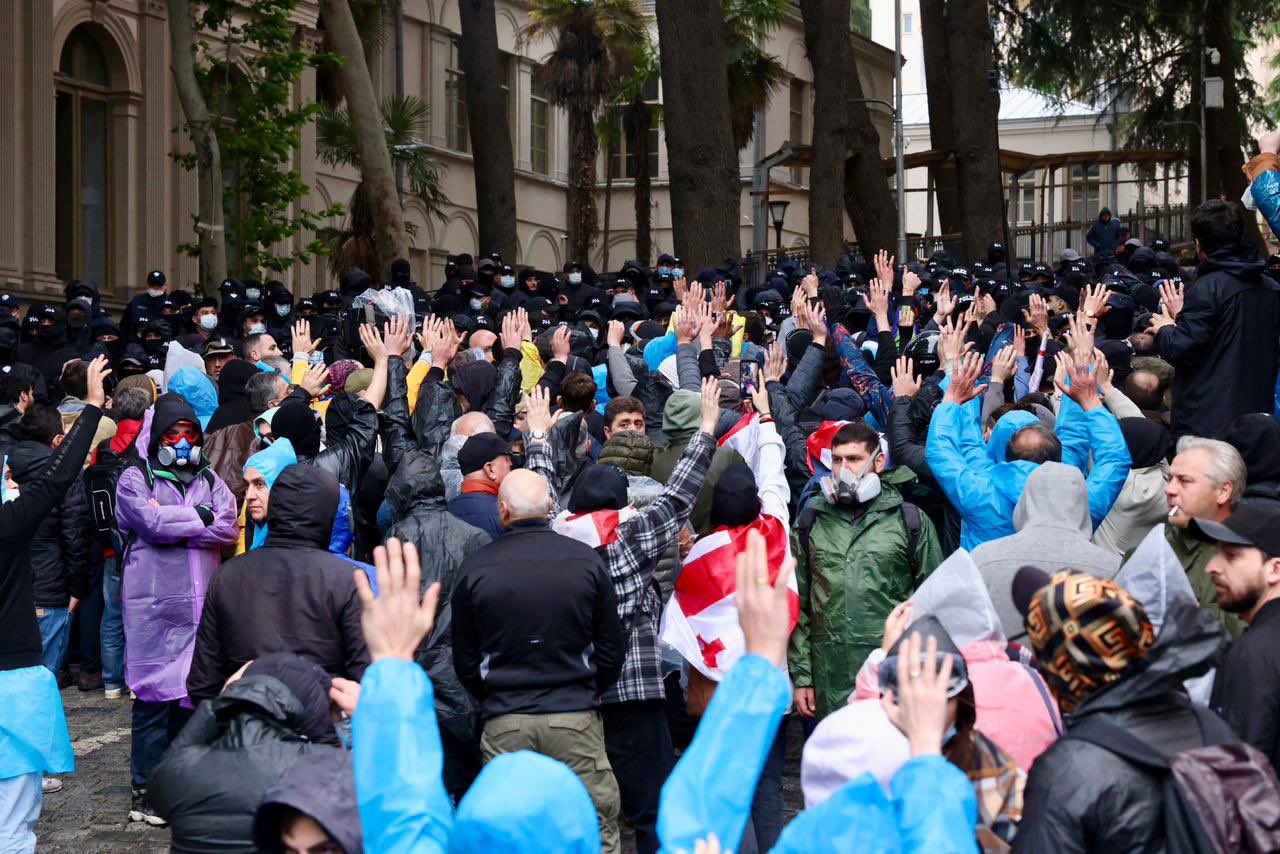
Specter of Russia’s FSB and Ivanishvili’s power vertical
What can be said for sure is that Georgia is now ruled by people who previously made their careers in the private firms of the Russian oligarch Bidzina Ivanishvili.
Grigol Liluashvili, head of the Georgian security service, served as head of security in Ivanishvili’s bank before the latter became a politician. Vakhtang Gomelauri, the head of the interior ministry, was Ivanishvili’s personal security chief.
Another previous prime minister and now chairman of the Georgian Dream party, Irakli Garibashvili, is someone Ivanishvili met in France when trying to buy helicopters from Russians as a private businessman. Garibashvili knew French and Ivanishvili said he’s a good guy who doesn’t need to be told twice what to do. That’s the power vertical of Ivanishvili.
As well, Ivanishvili himself appears to be influenced by Russian special agencies. In 2022, a phone call was leaked between Ivanishvili and Vladimir Yevtushenkov, a sanctioned major Russian oligarch with a close relationship to the FSB. The phone call revealed that Yevtushenkov is a close friend of Ivanishvili, suggesting at least some relations between Bidzina Ivanishvili and Russia’s FSB.
In the last couple of years, an investigation by Insider and Bellingcat revealed that Andrei Averyanov, one of the main GRU officers, was in Tbilisi in 2021. So, the Russians probably already have infiltration in Georgia.
There was an interesting case of Otar Partskhaladze, who was Ivanishvili’s first general prosecutor in 2013. Shortly after his appointment, a scandal emerged that he had been imprisoned in Germany for stealing goods from a mall. Ivanishvili got rid of him, but throughout the years, Partskhaladze remained an influential “Reshala” – a person related to the government who can help solve problems and has big interests in different sectors of the economy. About three months ago, the US State Department sanctioned Partskhaladze for being a Russian FSB spy.
So all these things suggest there is infiltration, though it is likely not as heavy as in Ukraine in 2014.
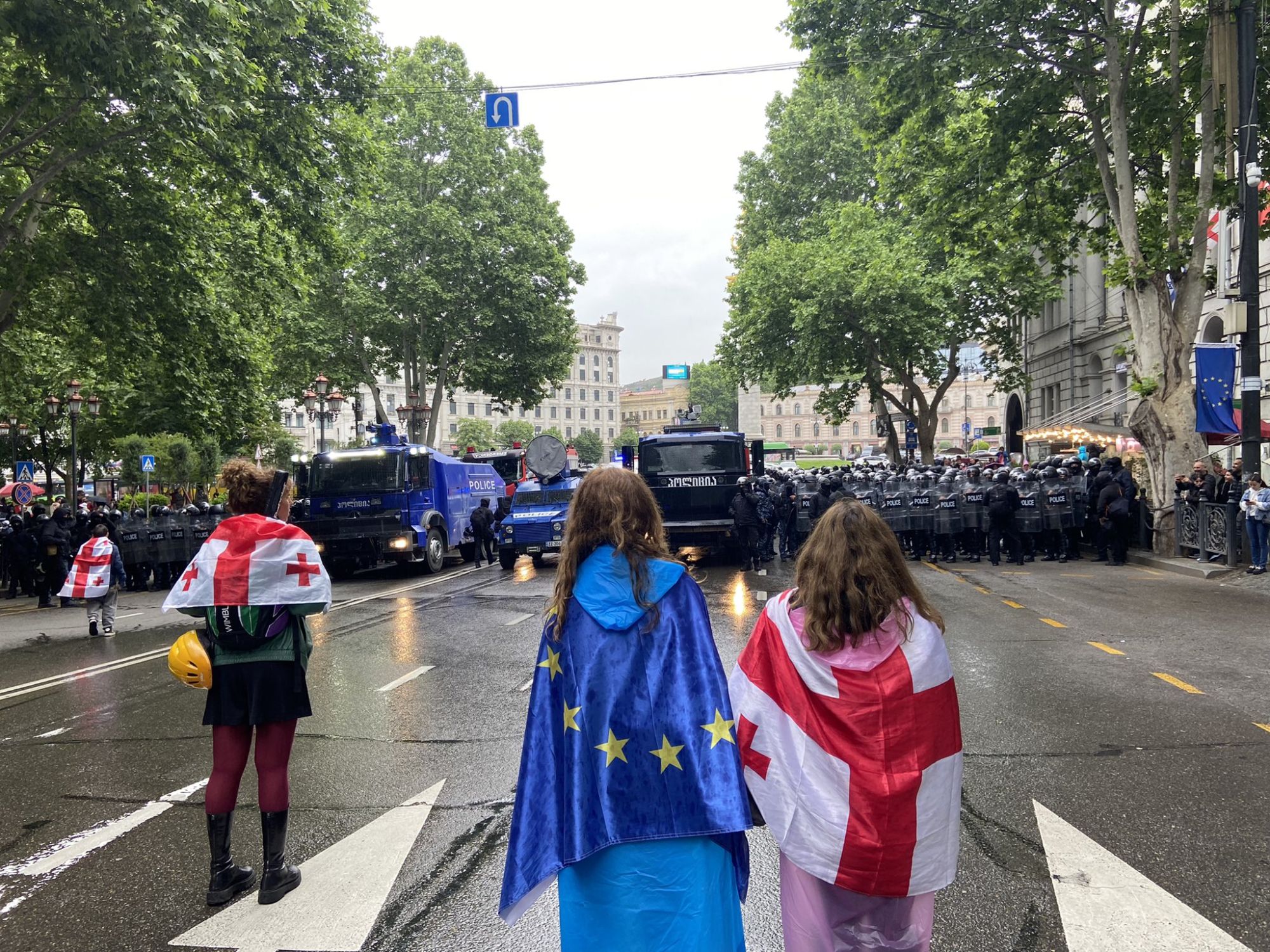
Russian threat hangs over Georgia just like over Ukraine in 2014
I don’t know what the final outcome of the protests will be. There are huge geopolitical implications at play.
After the invasion of Ukraine, Georgians once again saw that Russia is not a country of the 21st century, but the Russian Empire which wants to fight for its ideology and Putin’s crazy conspiracies.
Georgians have abandoned hope that Russia could one day be a different country with whom they can coexist peacefully while maintaining their dignity.
Granted, Russia is very busy in Ukraine right now, with hundreds of thousands of deaths. But if it decides to invade elsewhere, Georgia’s ability to self-defend is close to zero. Nothing was done to professionalize the army in the last 10 years, just like Ukraine entered 2014 and the Euromaidan Revolution with a very dilapidated army and basically no resources to fend off the Russian invasion or defend against the occupation of Crimea.
Ukraine’s sitting minister of defense at that time actually had Russian citizenship. Basically, all the other ministers of law enforcement agencies were also Russian stooges. They fled afterwards. I’m sure the campaign of disarming the Ukrainian Army was inspired in part by Russia. It’s part of their policy of disarming neighbors so they’ll be powerless to resist their eventual takeover by Russia.
We have some professional units and weaponry, but it’s effectively unimaginable for a country the size of Georgia to build an army big or effective enough to sustain a war with Russia, even for one month.
Although the resources and odds are not in Georgia’s favor, the government could have grown its own army and resources to make any aggression as painful and costly for Russia as possible. Nothing was done in this direction.
The notion of defending our own country was vilified in Georgia following the Georgian Dream’s coming to power in 2012. The idea that Georgia could effectively build its own army to make it more painful for Russia to invade Georgia again was essentially outlawed, as the ruling party claim the five-day Russo-Georgian 2008 war happened because of Saakashvili’s foolishness.
If you fight and die as a hero, and if you surrender or flee to Russia or somewhere else, you become a traitor. That’s the difference.
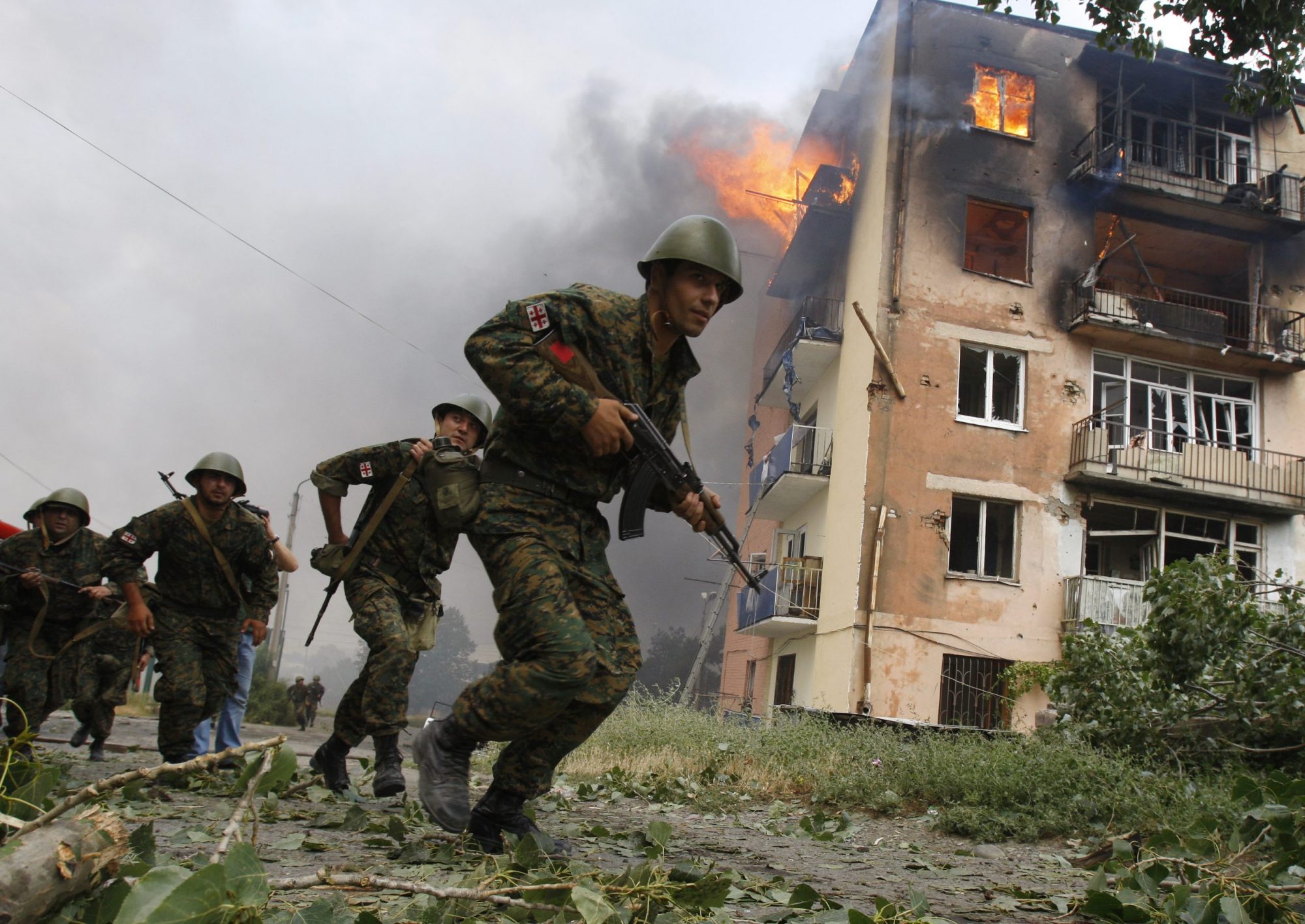
After 12 years of one-man rule, we have a lack of self-confidence that we can build effective institutions and an army to defend and deter Russia in Georgia effectively. This is a huge issue, not a happy place at all.
Obviously, Georgian society has the capacity to protest and resist. I’m quietly optimistic that in Georgia, this kind of direct dictatorship, this old-fashioned Russian-style direct dictatorship, is really unsuitable for such a small country.
We don’t know what actions Russia will take, especially when the West has no meaningful, effective tool to stop Russia. It’s a different situation than in 2008. That’s the main risk Georgia is facing right now. It’s really a country at a crossroads. We don’t know Russia’s calculations or appetite for new adventures.
A lot of Georgians are convinced that Ivanishvili and his party are ruled by direct calls or contacts from Russia to pass these Kremlin-style laws, and he’s just a mere agent of Putin.
Others don’t believe he’s a direct Kremlin marionette. Still, I can imagine a situation where the Russian government wants to impose its will, even on a matter that’s not so big.
At first glance, this law is not a vital interest to Russia, it’s not an issue of Georgia’s NATO membership.
But what were the stakes for Putin during Ukraine’s Euromaidan? It was an association agreement, a treaty with free trade and visa-free travel between Ukraine and the EU. And still, as it turned out, this was a red line for Vladimir Putin.
Ukraine war is a story of demolition of Russian imperialism
All of Russia’s neighbors come to a point where everything is a red line for Putin until you cease to exist as an independent country. Formally, you can remain independent, but you have to be subservient. At a minimum, you have no right to conduct your own foreign policy and no power to build an effective army. That’s what we’re seeing in Ukraine and Georgia. It’s not something new; even before Putin, Russia had a really long history of aggressive, expansionist wars in its neighborhood.
That’s why this talk of NATO expansion provoking Putin is silly. It’s not even about Putin, it’s about Russia’s imperial culture. It’s a story about a dying empire.
The Russian Empire collapsed in the Bolshevik Revolution, then the Bolsheviks scrambled it up again with the great help of the Georgian Joseph Stalin.
Georgia is undoubtedly part of this larger story that Ukraine is embroiled in: the great story of the dissolution of the dying empire in its final convulsive agony and how it tries to cling to its former colonies.
In Ukraine, it takes the form of a genocidal war. In Georgia, to this moment, the effort has the face of a hybrid approach – media campaigns, disinformation, puppets in the government, and other things. But it’s the same process. We are the frontier of this empire’s dissolution.
This revolution shows Georgia shares the same values as Ukraine. Every protest rally here has numerous Ukrainian flags, underscoring our perception of Ukraine’s war as our own.
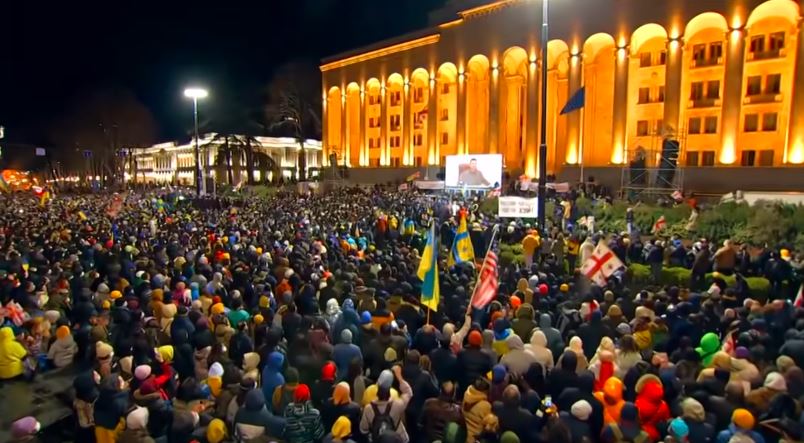
America has no right to isolate itself – American imperialism may not be ideal, but there are far worse things in the world. Some countries see America as their greatest hope for independence and freedom, which relates to some extent to Ukraine’s situation as well.
There is a general feeling that this war can be won if America truly intervenes and decides Ukraine is worth it.
Civil society: last chapter of resistance Ivanishvili tries to break with the “foreign agents” law
This law about civil society is perceived as such a danger to Russia and authoritarian powers because it’s the last chapter of resistance that Ivanishvili doesn’t control. He controls the whole state apparatus – the courts, executive power, parliament, with the president being the only exception as just a ceremonial role. And what men with power want is more power.
Even if he’s not directly controlled by Vladimir Putin, we’re seeing their interests coincide. Georgia has a robust non-governmental sector, and the first introduction of this law in 2023 sparked strong and organized resistance that forced him to revoke the initiative. Ivanishvili saw this as a personal defeat and a sign that he had no control over these chunks of society.
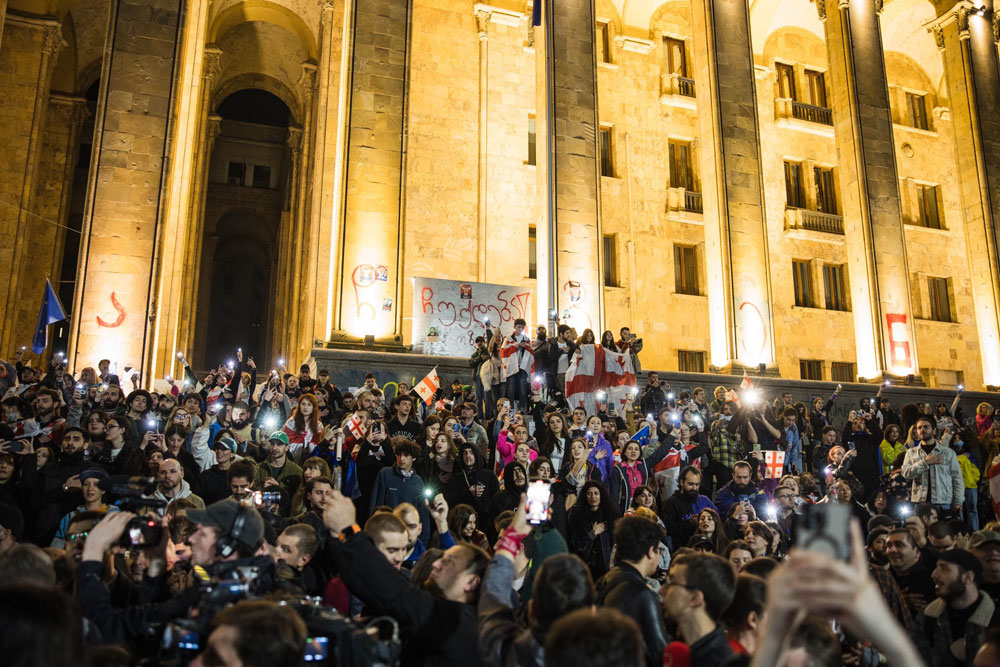
In my understanding, he believes the West will lose in this geopolitical conflict with Russia, especially in Ukraine. He wants to be on the “right side,” to get rid of this civic resistance, and rule for many years to come.
The situation is difficult because the opposition is constrained. They have no control over these large protest crowds. But even if we imagine the protests producing political representatives, what can the opposition demand? Not snap elections, since they’re due in October already. Ivanishvili is likely trying to break resistance ahead of October, to decrease the NGO capacity for monitoring election violations and media coverage.
The election process is crucial for him, as elections exacerbate the vulnerabilities of even authoritarian regimes. In Belarus, Lukashenko cracked down on all opposition for 26 years but still had major protests during elections in 2020. Ivanishvili wants to prevent those vulnerabilities by deciding this battle right now. If he wins by passing this law, he can always modify it later, but he’ll have become the winner against the resistance.
After that, with his state employees at 10-12% of voters, loyal businessmen, and maybe 20-25% genuine supporters, plus the repressive apparatus, it will be much more difficult for any organized electoral resistance to defeat him if this law damages NGOs beforehand.
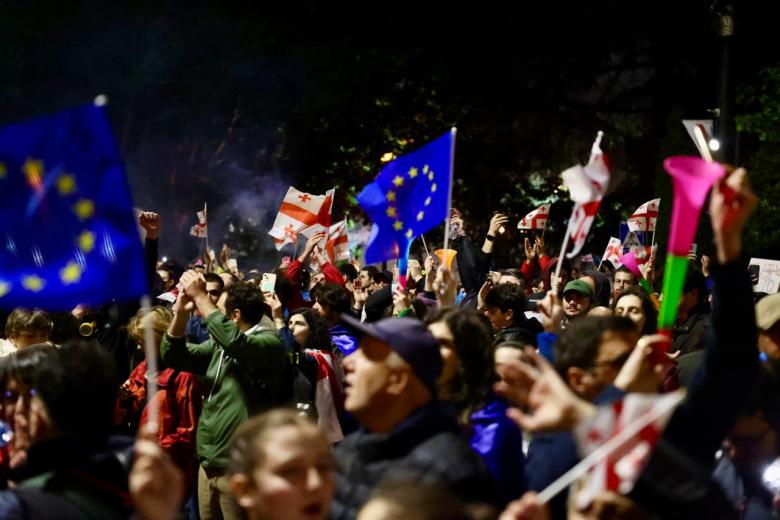
I don’t want to say he has no genuine support; he does to some extent. But if this law passes now, considering all his resources, it will be extremely difficult to counter him electorally.
The West will say the law damages Euro-Atlantic integration and will apply some pressure. But if Ivanishvili has decided the West will lose to Russia, he is more afraid of Putin than the White House threats. The West has leverage through sanctions, asset freezes, etc. But if Ivanishvili fears polonium more than Western instructions, his calculations won’t change.
The problem is that over 12 years, Ivanishvili created this pro-Russian elite class controlling the economy and media who want to maintain their positions at all costs. Some are not ready to be branded Russian agents, so there could be more government defections – we’ve seen ambassadors and state journalists quit already. But I don’t know if it will widen into bigger cracks or just get consolidated under Putin’s camp.
Ivanishvili isn’t in as firm a position as two months ago before this challenge emerged. There are big cracks now, and maybe he’s already on a track where his previous choices will force more and more mistakes against an emboldened civic resistance inspired by Ukraine’s heroism. It’s difficult to anticipate, but I remain optimistic Georgia will somehow prevail, only possible because of Ukraine’s incredible resistance providing hope for independence that wouldn’t otherwise exist.
Related:
- The world ignored Putin’s attack on Georgia. And so Ukraine was next
- From Rose Revolution to “Russian Dream”: Georgia at breaking point with pivotal pro-EU protests
- Russia’s triple strategy of proxy war used against Georgia in 1920 and 2000s
- Georgia’s risky gamble on Russia backfires as country falls into a trap, say journalists
- The revolution that refused to be crushed: how Ukraine’s Euromaidan defied Russia’s subterfuge

